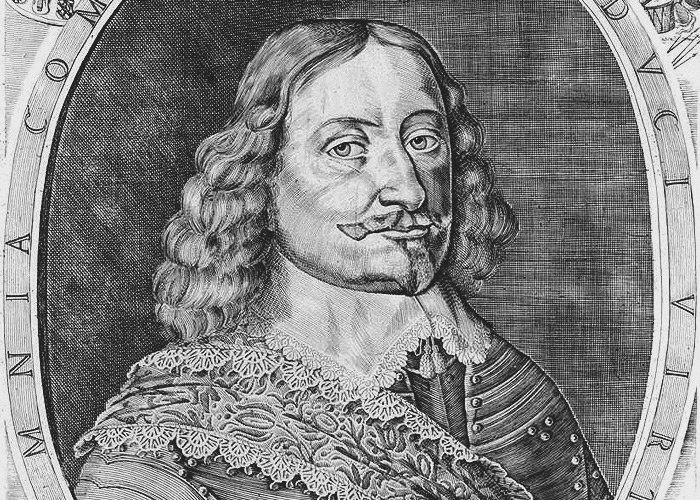Course #2 / Duchy of Courland and Semigallia

The name of Duke Jacob Kettler (1610-1682) is a synonym of the success of the Duchy of Courland and Semigallia. However, his path of becoming a well-respected and admired historical figure was full of ups and downs. Several quality custom essays mention this topic, without, however, referencing any significant details.
Duke Jacob was the son of Wilhelm Kettler and because of father’s exile, the future ruler of Courland and Semigallia had to spend his childhood in German and Czech lands. He was an enthusiastic student in the universities of Leipzig and Rostock. Jacob’s interests included history, geography, philosophy, religion and other fields of study. He never stopped learning and reading educational literature. Education was a crucial part of his later success. Young Duke spoke multiple languages, from his native German up to Latvian, Russian, Polish, French, Dutch and others.
Despite being more interested in the shipbuilding and economic ventures, Duke Jacob did his part on the military scene as well. In 1633, he led a Curonian regimen in the Smolensk War between Polish-Lithuanian Commonwealth and Russia. Since King of Poland Wladyslaw IV agreed to renew the Duke rights of Wilhelm Kettler and his son, it was a question of honor for Jacob to participate in a war against Russians.
When Jacob became the Duke of Duchy of Courland and Semigallia, he finally could convert his knowledge and ideas into a real success story. A fan of mercantilism, Duke Jacob initially had a poor and war exhausted state to start with. On the opposite, Duchy was kind of a personal business venture of Duke and this fact added some extra enthusiasm for the young ruler. Duchy’s income equaled with Duke’s income. Formally, Jacob did not have total control of Courland and Semigallia, but in reality, he was the main landowner in his state. He owned all the major manufactures and fleet. This is a part of his biography that often is romanticized in literature. Duke Jacob gets portrayed as if he was an overly patriotic and caring ruler of his nation. This is historically incorrect.
Primarily, Duke Jacob was an eager mercantilist, who cared about his own income and wealth. He strongly believed that money could solve all the problems of Duchy, including diplomacy and military spheres. Jacob had dozens of trade agents and diplomatic representatives in all the major European cities. In the Golden Years of Duchy, it had several trades and personal agreements with England, France, Dutch Republic, Spain, Venice, Denmark-Norway and other countries. Tensions in Europe were almost never-ending in the 17th century, so Duke Jacob often had to be very slick and cautions in the diplomatic relations with the leading European nations. Duchy constantly balanced on the edge of failure and Jacob often was caught in a weakness of trusting the wrong people in these diplomatic maneuvers.
Neutrality policy and careless attitude against own army eventually made great damage to Duchy and Jacob’s plans. Theoretically, at Duchy’s Golden Years he was wealthy enough to invest funds in strengthening Curonian army and his own guards. Several manufacturers in Courland and Semigallia produced quality military goods for export, such as gunpowder, cannons, and muskets. However, Duke Jacob was too busy with his business and colonial dreams. While he was enthusiastic about bringing Dutch masters for shipyards and manufactures, and high costs in this regard did not bother him, Curonian army was left on its own without any mercenaries from abroad.
It is clear that with a strong army, years of prosperity in Courland and Semigallia would have lasted longer and the outcome of Northern Wars would bring less damage to the Duchy. In reality, Duke Jacob exposed his weaknesses to the major European courts after his capture in 1658. This caused a loss of respect and acknowledgment that Duchy is not capable of protecting itself and being a powerful player on the European political map. Of course, Duke Jacob deserves credit for particularly re-building the lost manufactures and shipyards, but his diplomatic and trade representatives were not as influential, as in the Golden Years of Duchy.
Local nobility also was something Jacob had to deal with. They were afraid that Duke could gain too much power and take total control of Duchy. His father also had fierce relationships with nobility and they managed to overthrow him. King of Poland was occasionally hounded to create obstacles on Jacob’s path. However, he was less aggressive towards nobility than his father Wilhelm was. Duke Jacob tried to settle down problems without showing his power or violently removing his direct opponents.
To summarize the 44-year long journey of Duke Jacob as a ruler of Courland and Semigallia, there is a good quote said by the King of Sweden Charles X: «Jacob was too rich and powerful to be a Duke, but he was too small and poor to become a King».
This quote is true, but this does not mean that the era of Duke Jacob should be painted in the dark tones. He was not a perfect ruler, but you will rarely find such in the history of our planet. His weaknesses were overshadowed by his economic successes. Duchy of Courland and Semigallia saw its Golden Years in Jacob’s era and in this regard, Duke remains in his own league. None of his predecessors or successors gained that much of respect and historical reminiscence.
Sources | Edgars Andersons. Senie kurzemnieki Amerikā un Tobāgo kolonizācija (1970) | Jānis Juškēvičs. Kurzemes hercogi un viņu laikmets (1993) | Alexander Valdonis Berkis. The history of the Duchy of Courland (1561-1795) (1960) | Aleksandrs Grīns. Trīs gadsimti un trīs vadoņi (1937)

